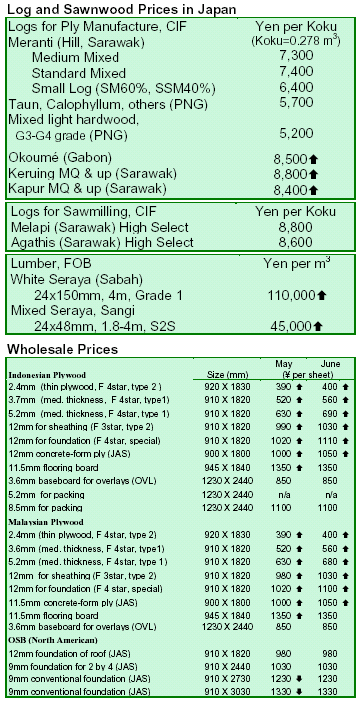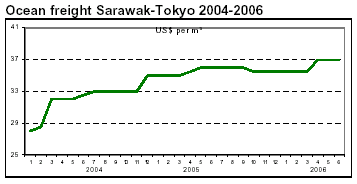|
Japan
Wood Products Prices
Dollar
Exchange Rates of 8th June 2006
Japan
Yen 114.28
Reports
From Japan
Japan’s PPP lists acceptable certification schemes
The Japanese government has indicated the certification schemes that would meet the requirements of legality and
sustainability of its public procurement policy (PPP) for forest goods and services. The list include FSC and
PEFC for Europe; FSC, SFI and CSA for North America; FSC for South America; FSC, MTCC and LEI for
Southeast Asia; FSC and PEFC for Australia; FSC for New Zealand; FSC for Africa; and SGEC and FSC for
Japan. Japan’s PPP for forest goods and services has come into effect on 1 April 2006 and has been adopted
under the “Law Concerning the Promotion of the Procurement of Eco-Friendly Goods and Services by the
State and other Entities”. The law requires that all timber bought by the state should be legal according to forest
laws in producing countries and sourced from forests under sustainable management.
Plywood market turns active amid restricted supply
The plywood market in Japan is becoming gradually active. Major house and power builders are placing
increased number of orders in expectation of future rise of the price of plywood. However, the production of
thin/mid-thick plywood has dropped by half due to scarce meranti regular logs. The scarcity of some grades such as
G1 grade (for floor base) 2.4mm, 3.7mm, and 5.2mm
plywood is particularly serious in Japan. This is due to shortage of high-quality logs and delayed production in
Indonesia, the main source country. Factories in Malaysia are also having trouble collecting good-quality
logs for the manufacturing of thin/mid-thick plywood. Manufacturers of building materials have begun to make
inquiries for substitutes such as protective boards, MDF,
OSB and particle boards.
However, Japanese imports of plywood (regular plywood, special plywood, blockboards, etc.) increased
in March after four months of continued decline. Plywood imports surged 22% to 405,000 m3 from
February 2006, up 13% from March 2005. Imports from Malaysia rose 27% to 216,000 m3 while those from
China climbed 61% to 40,000 m3. Imports from Indonesia declined for the 18th consecutive month,
falling 8% to 140,000 m3.
Plywood prices scale record highs in Japan
As plywood supply from Southeast Asia worsens and inventories decrease in Japan, prices continue to edge up.
In Tokyo market, prices for imported JAS 3x6 concrete forming plywood hit ¥1,000 per sheet delivered in May,
the highest level since April 1999. Price may rise as
importers do not guarantee more volumes at that level. Due to the extreme tight supply, Seihoku, the largest
manufacturer of plywood in Japan, has increased sales prices and announced further raises from mid-June.
Housing sector upbeat on building activity
Results from the Japan Federation of Housing Organizations (JFHO) quarterly survey show that
business confidence was up 41 points in April-June 2006 with respect to the expected number of orders for house
construction. The market is expected to grow this year as overall economic circumstances are better than in 2005.
Analysts think that the anticipation of a higher interest
rate is likely to push up demand. Housing companies are planning to develop their business aggressively to cope
with increasing orders.
Precut lumber dominates house wooden framework
Japan Wooden House Machinery Precut Association reported that 76% of the houses built in 2004 with
wooden framework used precut lumber. Precutting requires dried or laminated lumber timber suitable for
automatic processing system and high dimensional accuracy. The share of laminated lumber, mainly
European lumber, has jumped from 2% in 1997 to 45% in 2006.
Japan, Vietnam agree to launch FTA talks
Japan and Vietnam agreed on Friday to launch formal negotiations aimed at sealing a bilateral free trade
agreement later this year. The timing of starting the formal negotiation process and details on areas to be
covered by the accord has yet to be defined. Vietnam has previously signed an FTA with the USA while, for Japan,
Vietnam will be the sixth Southeast Asian economy to be engaged in official talks on the pact. Vietnam, a member
of the Association of Southeast Asian Nations (ASEAN), will strive to conclude FTA talks with Japan by next
March. Japan has an FTA with Singapore and has signed one with Malaysia. It has struck basic accords for similar
undertakings with the Philippines and Thailand, and has been in official talks with Indonesia.
Japan has held preparatory FTA talks with Brunei and is aiming to start the negotiation process later this year.
Japan, however, does not intend to sign bilateral free trade accords with the other ASEAN economies of
Cambodia, Laos and Myanmar. Japan and Singapore agreed recently to start reviewing in June their
FTA, which came into effect in November 2002.


More information on Japan in www.n-mokuzai.com
|